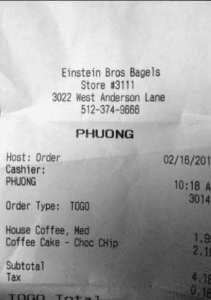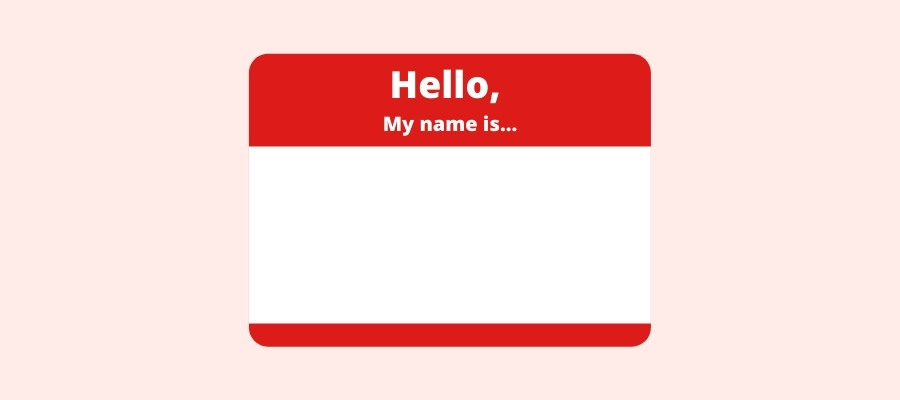Say My Name
Beyoncé and I have so much in common: our love for Texas, mutual respect for Sir Jay-Z and difficult-to-pronounce names. Now, I admit that Queen Bey (with 17.2+ million albums sold) might now be a household name. However, I’m confident that 8-year-old Beyoncé and I lived the same life.
Stranger: Hi, little girl. What’s your name?
Me: Phuong
Stranger: What?
Me: Phuong
Stranger: Thong?
Me: Ph-Ph-Ph-PHUONG
Stranger: Well, now! I’ve never heard that before!
Me: (silence)

As an adult, I expect mispronunciations and interesting coffee orders (Exhibit A). So, why am I talking about this? As a bilingual speech-language pathologist, I’m lucky. I get to work alongside children, adults and families from diverse backgrounds. Speaking and hearing another language is a gift, and I love hearing the tones and rules of many tongues. I am also privy to names that are uncommon in the United States, and this means I hear the commentary.
Recently, I read over 500 comments made by professionals in our field who listed “funny names” of students they’ve served. This was hurtful and unacceptable, and I want to talk about it.
Why Are Names Important
As someone who grew up with a name not common in the United States, I can recount numerous occasions when peers and teachers let me know I was different. I come from a father who fought in South Vietnam, served as a POW and navigated 56 people from his home country on a wooden boat. I come from a mother who got onto that boat, persevered for 11 days and gave birth to me after the boat landed in Hong Kong. I have always known that my name means “going in the right direction,” and this brought my parents joy and solace. I say this because all names are chosen for a personal, individualized reason, and those stories must be honored.
Names are important because they are attached to a human we serve, and it’s a word the child will hear and say repeatedly. We are lucky be in a profession that provides children with ways to communicate, advocate, and empower.
Tips for Remembering Names
1. Decide to Remember Make a conscious decision to remember the name. Take responsibility for this objective and push aside dialogue that does not yield accountability (e.g., too hard, bad memory)
2. Pay Attention Listen for the person’s name. Be deliberate about it. Listen to the syllables, the sounds, the cadence. If you forget during the time you’re together, ask again. “I’m so sorry. Tell me your name again.”
3. Practice You practice a name by using/thinking/writing it repeatedly. When you hear the name, practice saying it aloud. Then, say it quietly in your head. As you talk to the child, use his name in conversation. When you ask a question or make a request, begin by saying the child’s name. After a session, write it down phonetically.
4. Brain Associations The brain likes connections. Use a visual or a rhyme to help you remember. For me, I now say, “Phuong. It rhymes with Hong Kong. It’s where I was born.” When I met my birthing coach Siobhan (sounds like “shu-von”), I imagined her “shoving” a “Von Trapp” child up the stairs.
Moving Forward

In February of 2014, I went into a coffee shop. Then, the moment came. “What’s the name on the order?” I told him. “How do you spell that?” I told him. I received my coffee, and I left. The next day, I walked in. The same gentleman looked at me, “Good morning, Phuong.” I smiled. Then, I received my coffee, and he remembered how to spell it. It was a glorious morning, and I have the proof (Exhibit B). Doc, the gentleman, made an effort, and it was surely meaningful.
In conclusion, SLPs, may our children know that their names are valued and will serve them well.




Thank you so much for this post. Very well-stated.
Thank you, Chelsea. It’s easy to state my thoughts on a topic that resonates deeply. Take care.
Beautiful entry! Thank you!
Thank you, Gabriela!
Beautifully written and I’m thankful you tackled this subject-something needed by all of us to think about, SLP or not. My daughter’s name is Ayla (pronounced like “kayla” without the /k/. Not “Aliyah, Alla, or “eye-lah.” Her name has deep significance and meaning. It means Oak Tree in Hebrew. And her name fits her: she is strong-minded, a leader but also has a heart of compassion for others (provides shade when needed). And other qualities, too. Love you, Phuong. 🙂
Julia! Oh, how I love the meaning behind Ayla’s name. I especially love her heart and willingness to give shade to lift up her fellow humans. This is surely her superpower (and a testament to her upbringing). What a gift you gave as a foundation to her life’s work and place in this world. Here’s to all names, Julia. And, love to you, dear.
Thank you for writing and sharing this. I could not agree more, and it’s important because who we are (and who the people we work with are) is important, and what could be more central to who we are than our name? I applaud you and will keep this in my heart as my school year starts.
Virginia, thank you. You are so right–what’s more central to who we are than our name? I see that your moniker belonged to the first English baby born in the New World. How fitting that you advocate for the diversity of names that exists in our country. Here’s to a great school year, Virginia.
This post resonates with me strongly. 20 years ago I named my newborn daughter Isis for my own personal reasons. As a child, she loved that her name seemed unfamiliar to some and she often got two chances to say her name and usually had to spell it for people too. When she was in high school, the terrorist group ISIL became more prominent in the news and the name “Isis” was ubiquitous and not in a good way. She initially made a lot of jokes about it, but later she admitted she used her middle name while working as a waitress or used mine when ordering coffee to go just to stop the stares and comments for a while. She still loves her name and is back to displaying it with pride on her name tag at her job as a lifeguard. Thanks for the post.
Lisa, thank you so much for sharing this story. I whole-heartedly understand what it feels like to have a name that yields opportunities for commentary and potential ridicule. It brings me comfort to know that her name-journey has now returned to her lovely, lovely moniker. Here’s to continually honoring all names and empowering others. Take care, friend.
I really appreciated reading this article. It is good for us to be reminded of our own social skills errors when we make them and have the opportunity to learn from them. I also saw these same comments. I appreciate your gift of awareness and your clear voice in writing a message, I did not know how to express. Thank you.
Hi, Tammi. Learning is what we bestow our students, and learning is what we continually do as SLPs. Love to my Alvin ISD SLPs. I appreciate you reaching out.
As the others have already said, this is a wonderfully thoughtful post that is so important. I too had difficulty with my name growing up. Back then, “Gina” was not common at all. I was the only one. It was pronounced wrong all of the time (and a not so nice prefix was sometimes added to it for humor that was not funny) so I often thought about using my much more common and accepted middle name “Michelle.” Of course there was also the issue that no bicycle mini license plate ever had my name which made me sad. While my name is much less unusual now, I’m still often called “Jenna.” My name too was specifically chosen for a special reason so I now embrace it.
At my diverse elementary school, I’ve worked with a couple of other little girls named “Phuong” and they were special people too. Your parents chose well.
Gina, thank you so much for your words. I’m glad we both have arrived at a place that brings meaning (and empowerment) to our names. And, it warms my heart to know that YOU are at the campus with children who share my name. Gut tells me they know the worth and value of their given moniker. Take care, friend.
I can really relate to this article. All through childhood I had only one teacher that pronounced my name correctly. I remember thinking “Wow, my name is really pretty.” My confidence grew that year, and I developed a love for school and learning. Thanks for sharing.
Keita! KEITA! Wow. Thank you for sharing this story. I’m grateful for your teacher. The outcomes of her actions were surely meaningful. And, what a lovely, lovely name, Keita. Take care, Phuong.
I love this! Someone always mispronounces my last name (“Manchack”) and it’s been quite interesting and annoying to hear the many variations (imagine a bunch of 7th grade boys and how they “mangled” that name for their humor). Another thing I have heard from people is that they go by a different name because it’s easier rather than their actual name because it is too hard to say! I have always asked them to please share their actual name with me because it is their name! I think it makes a person feel diminished when they have to choose an alternate name because of this. Maybe not, but I feel a person’s name deserves to be said regardless of difficulty. It is just a respect thing. It is our identity! It is also why I insist on spelling both my first name and last name since they are not standard.
Karin! You bring up such a good, good point. Names are important, and it is not necessary to use a water-downed version. I will start quoting you, “A person’s name deserves to be said regardless of difficulty. It is just a respect thing.” Love to my Mesquite ISD SLPs, Karin. Take care, Phuong
In Turkey where I taught English as a Foreign Language, I made name cards for all of my 160 or so students. They kept them in their course folders and placed them on their desks for the first week or two. Using the practices that you describe, in addition to seeing their names and speaking them every day for a while, it became easier and easier for me (a native speaker of American English) to pronounce them correctly. Establishing this “name” connection helped get us off to a wonderful year together.
Rebecca, thank you for sharing your effective strategy. Visually seeing their names regulary would definitely be helpful. I am so glad you took the time to honor such a valuable part of their education–their name. You surely made an impact with your 160 students in Turkey. Thank you. Thank YOU!